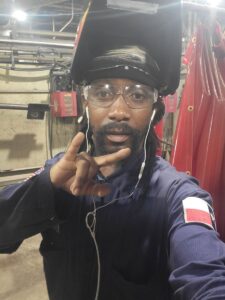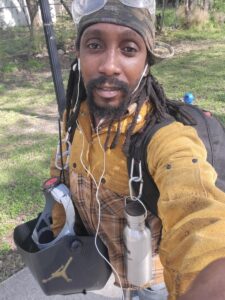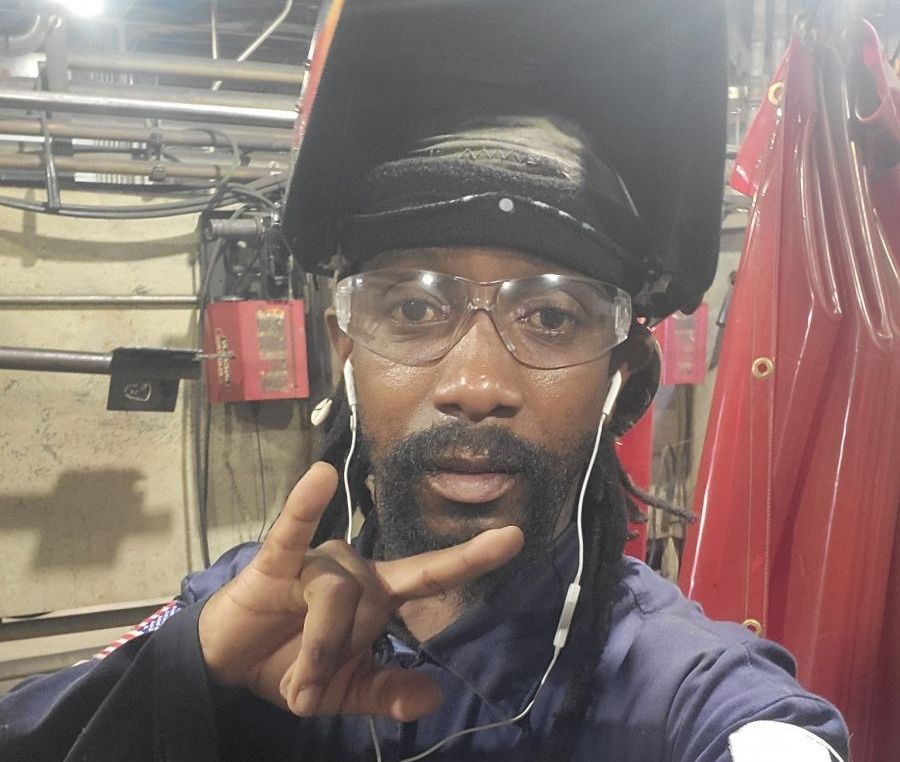TWS is a Great Training Option for Everyone
Learn more about how we can prepare you to advance your career.
Kevin, 37, was born and raised in Nairobi, Kenya, but moved to Seattle, Washington, with his family in 1998 at the age of 12. Kevin graduated from the Professional Welder program at Tulsa Welding School & Technology Center in Houston in August 2023.
Thanks for sharing your story, Kevin. What did you do before coming to Tulsa Welding School?
I’ve done a little bit of everything and moved about a lot. I dropped out of high school and went on a sabbatical. I went to London, did some traveling, and then came back. I went to college for an Environmental Science degree. I was a professional student for a good three years, but that didn’t pay the bills, so I dropped out. It’s something I’ll hopefully pursue or finish later on in life because it interests me.
I’ve had customer service and sales jobs. Then, in 2015, I moved to Texas; I got a chance to work in the construction industry as a laborer and do a little carpentry. I’ve always been fascinated with that industry and enjoyed working with my hands. When I was little, I made things and helped out at the farm. It was hard to get a construction job in Washington state, but in Texas, the construction industry was really big, so it was much easier to get hired. I did a lot of residential work, some commercial work, and I enjoyed it. I also did landscaping; I still cut trees today from time to time – it’s decent money!
Have You Considered a Career in the Skilled Trades?
Fill out the form to recieve a no obligation info packet.
Where did the idea of going to welding school come from?
Welding was actually the reason I moved to Houston in 2015. Back in Washington, one of my friends traveled all around the country as an underwater welder. Underwater welding is the top line as far as welding goes in my opinion. He told me all about welding, so I moved to Houston because of the oil and gas industry, and thought I’d figure it out when I got here. That’s kind of how it started.
So, if that was 2015, why did you not start at Tulsa Welding School until 2023?
I did attempt to go to a welding school years ago, but the school I applied to wanted me to find an extra $7,000. I had financial aid but couldn’t cover all the expenses; they said I had to pay the extra out of pocket. I’d done their whole orientation, but I couldn’t start unless I came up with the money. This was before I’d heard about Tulsa Welding School in Houston, which had only opened a year or two before.
So, how did you discover Tulsa Welding School?
I had to figure something out; I was tapped out. I was barely working. Construction slowed right down after life got back to normal after Covid. I couldn’t figure out where the next job was coming from. So, there I was surfing YouTube and an advertisement for TWSTC came up. I was like, “Wait a minute, there’s a Tulsa Welding School in Houston?” Anyway, I put in my information and later that day a rep called me back. We stayed on the phone for two hours, three hours, talking about my situation, my goals. There was no sales talk, no pressure, it was all very calm. I enrolled right there on that phone call; he took me through all the financial aid paperwork and stuff. In a way, it reminded me of when I used to sell Kirby vacuum cleaners – if the product is good, you don’t need to sell it, it’s going to sell itself.
That’s great. What did you enjoy most about your experience at Tulsa Welding School?
I enjoyed their open-door policy. If I had anything on my mind, or if I had any kind of frustrations, I could go to anyone. The campus president, the lead instructor, even the guy working at the student store! It was an open-door policy all the way around. Literally for that seven, eight months, it felt like home. It was my home. I made it my home and it felt like a real workshop. Like, come in and learn. They’ll even let you stay late if you want to, or you can come in at weekends if you want to.
What class did you do, and did you put in extra time to practice?
I did morning class; I function better in the morning. I could stay and practice in the afternoons if I wanted. On the weekends I did odd jobs to pay my bills. I’m a tree cutter, so I could make pretty decent money cutting some trees, enough to survive. But I kept my weekdays completely open because of how labor-intensive school is. I just dove in, man, headfirst.
 You mentioned frustrations earlier. Did have difficult days, or did the program come easy to you?
You mentioned frustrations earlier. Did have difficult days, or did the program come easy to you?
Of course, every step of the way. But I told myself it’s okay to fail because the faster I ask for help, the faster I’m going to learn. The instructors are right there all the time, you can ask any of them a question.
When something really got to me, I just walked away and took a break; you don’t have to be in that booth all day. If you feel frustrated, take a break; walk outside, get some fresh air, get some refreshments, go to the vending machine, and then come back to it. They said the process of learning there was ABC – Always Be Comfortable. If you’re frustrated, you’re not comfortable. You’ve got to Always Be Comfortable before you weld. I love that, I’ve kind of applied that to my life now.
That’s sounds like a good line to live by! Where are you working, and how did you get the job?
I’m at Ingalls Shipbuilding in Pascagoula, Mississippi. We build 70% of the Navy’s surface fleet. I got the job through Career Services.
Congratulations – tell us more about that.
One of the big things they talk about at orientation is to familiarize yourself with Career Services. Go in during your first, second, third month. Let them know who you are. I don’t care if you’ve still got five months till you graduate, just talk to them, see what’s going on, see how the job market’s looking. That’s what I did. I found out a lot of information about job fairs and different events that I attended, and that’s how Ingalls came about. I found out that they come to the school twice a year to weld test students and graduates. They have an Ingalls recruiter who does the recruiting right there at the school. I missed their first test, but I did it the second time around six months later. I passed it and they made me an offer I liked. I got hired on August 07 and finished class on August 11, so I got the job before graduating!
Are you happy with the paycheck?
There’s always room to grow, that’s the beauty of welding. You can take it as high as you want. To answer your question, I think it’s a hell of a start when you look at other careers. As long as you show up to work and you like what you’re doing, you can always excel. Once you excel, you’re going to get paid. So yeah, I think straight out of welding school with no experience, making $40k starting is not bad. If you’re 19/20 years of age coming out of Tulsa, you could be making six figures by the time you’re my age. It’s not just salary, with Ingalls the benefits are great. I’ve got health insurance, dental, vision, and a 401K. I’ve even got financial advising! There’s a lot of good benefits, and I’m in a union now.
That’s awesome! What’s your career plan from here? What about that underwater welding?
The ceiling is wide open. I don’t necessarily have to stick to structural welding, there’s a lot I can learn here. I can see me being here five or ten years. I believe you can do anything you put your mind to. So, underwater welding or offshore work is always possible if I’m ready for it. I enjoy my craft so much that I want to learn every aspect of it. So, it’s not out of the realm of possibility that one day that I might do it. But as of right now, I can honestly say I’m pretty happy about my choice and I wouldn’t change it at all.
What do you enjoy most about being a welder?
I like my craft, I love it. I love to strike that arc. This job gives me a real sense of purpose. One of the logos they have here is “Their mission. Our Purpose.” It’s a hard job, but there’s a sense of accomplishment because I know what I’m building. It’s so cool. But what I really enjoy about being a welder is that you can use it for so many things, welding is versatile. If you want to go into art, sure, build some stuff and put it in an art show. The world needs welders. Welding is one of the things that built this country. It’s one of those trades that is very underappreciated. Not a lot of people can say they do what I’m doing.
Did you make some connections in school? People you’ll stay in touch with.
Yeah, I’ve got a whole band of friends. I’ve got one out in west Texas working on the pipeline, I got another friend, she’s here working at Ingalls now. Another friend, Brooke, she works at a shop in Houston. I tell you women make the best welders, man. Those blue-collar women…they’ve got to be tough.
What advice do you have for students to be successful at Tulsa Welding School?
I would say first, you have to take that first step. I finally get to do what I’ve wanted to do for the last 10 years because I took a chance on something, and I’m glad I did. I wasn’t afraid of failing, I wasn’t afraid of the struggle. I blindly just went in and said, what the hell!
Second, don’t be scared to fail. There are a lot of people at the welding school who have worked in the industry for years, and they’re just there to help you. They’re not there to discourage you. They’re there to literally just show you how to do this. It’s okay to fail. It’s okay if you don’t get it the first go around. The more you burn, the more you learn. That’s the way I look at welding, the more you burn, the more you learn. The more you strike that arc, the more you’ll hit your mark. It’s repetition, it’s muscle memory. If you give it everything you’ve got and more, you can’t fail.
If you’re a TWS graduate and would like to share your success and be an inspiration to others, please email [email protected] to be considered for a Graduate Connection interview. Please include details such as your graduation date (month/year), program, and campus name (Tulsa/Jacksonville/Houston/Dallas).






